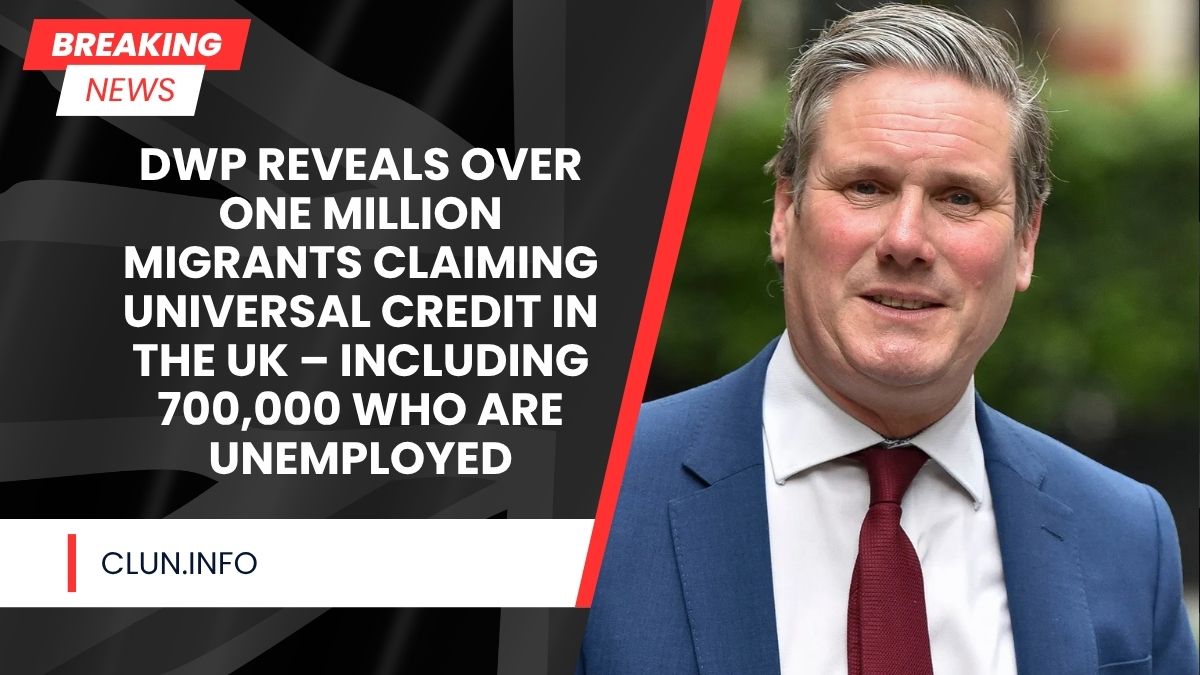The number of migrants claiming Universal Credit (UC) in the UK has soared to over 1.26 million in 2024, according to the latest figures from the Department for Work and Pensions (DWP).
This marks a significant rise from 883,470 claimants in 2022, highlighting a sharp uptick in just two years.
Breakdown of Claimants by Immigration Status
Among the 1.26 million non-British claimants, EU nationals represent the largest group, totaling 770,379. Additionally:
- 211,090 are non-EU nationals with Indefinite Leave to Remain (ILR)
- 118,749 are refugees
- 54,156 are holders of humanitarian visas
- 75,267 possess time-limited visas
- 33,240 fall into the ‘other’ immigration categories
These figures highlight the diversity of immigration statuses among current UC recipients.
Employment Status of Migrant Claimants
Out of the total migrant claimants:
- 737,799 are currently unemployed
- 510,970 are employed but still require UC to supplement their income
In contrast, 6.6 million British citizens are also receiving Universal Credit. Among them:
- 4.3 million are unemployed
- The rest are receiving in-work support
Political Reactions and Growing Criticism
The data has triggered strong political reactions and criticism of current welfare and immigration policies.
Chris Philp, Shadow Home Secretary, stated:
“These figures confirm that the current system is out of control. Universal Credit should be exclusive to UK citizens—it’s a matter of fairness and protecting those who have paid into the system.”
Tory MP Neil O’Brien added:
“We’re not attracting the ‘best and brightest’ as promised. Instead, taxpayers are burdened with supporting migrants who often become dependent on benefits.”
Rob Bates, from the Centre for Migration Control, emphasized:
“With over 1 million migrants claiming benefits, we need to re-evaluate Indefinite Leave to Remain and tighten eligibility.”
John O’Connell, CEO of the TaxPayers’ Alliance, warned:
“We are headed for a worklessness culture, where both migrants and native citizens fall into long-term benefit dependency.”
The Bigger Picture: Public Finances and Welfare Pressures
Universal Credit, designed to aid those out of work or on low incomes, is now at the center of a national debate on sustainability, eligibility criteria, and public spending.
While millions of working households struggle with high costs of living, experts note a growing pressure on welfare resources.
Some argue that many migrants in work and receiving UC do pay taxes, but their reliance on benefits reflects a broader affordability crisis, not abuse of the system.
Who Qualifies for UC Under Current Rules?
Only certain immigration statuses allow access to UC:
- Settled Status
- Refugee Status
- Humanitarian Protection
- Indefinite Leave to Remain
Migrants with No Recourse to Public Funds (NRPF) cannot claim UC unless their status changes.
What Should Britons Do Now?
As the conversation intensifies, UK residents are encouraged to:
- Check their UC eligibility—especially if they’ve recently lost work or seen income reductions
- Explore additional support through Pension Credit, Council Tax Reduction, or Housing Benefit if not on UC
The sharp rise in Universal Credit claims by migrants—from under 900,000 in 2022 to over 1.26 million in 2024—has ignited calls for welfare reform and immigration policy reviews.
While many are concerned about the strain on public finances, others highlight the economic contributions of working migrants caught in a national affordability crisis.
As the UK grapples with balancing support for citizens and managing fair immigration rules, the future of Universal Credit remains a critical issue.
FAQs
Can migrants legally claim Universal Credit in the UK?
Yes, but only those with specific statuses like settled status, refugee status, or Indefinite Leave to Remain are eligible under current regulations.
How many British citizens are currently claiming Universal Credit?
As of 2024, 6.6 million UK citizens are receiving UC, with 4.3 million of them not in work.
Why are employed people still relying on Universal Credit?
Due to rising living costs, low wages, and increasing housing expenses, many working individuals still require UC to supplement their income.

